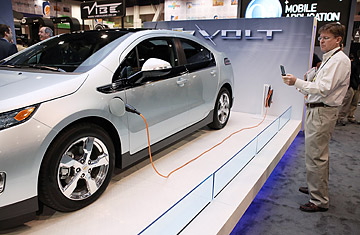
A Chevy Volt on display at the 2010 Consumer Electronics Show in Las Vegas
Hold the vroom and bring on the zoom because the theme of the most important motor show in the U.S. is electricity, with carmakers ranging from Chrysler to Ford to Volkswagen presenting battery-powered new models. After nearly two decades of failed promise, 2010 could finally be the year of the electric car, with at least two major models — the plug-in hybrid Chevrolet Volt and the all-electric Nissan Leaf — set to hit dealers' lots by the end of the year.
Automakers will still need to convince skeptical consumers to go electric — and even some of the top models, such as Chevy's Volt, will come with range limitations and high sticker prices that could discourage many drivers. But a new report by the consulting firm McKinsey finds that in megacities — metropolitan areas with over 10 million people — there might already be enough interest to get electric cars moving off the lots surprisingly fast. In New York City alone — one of three megacities McKinsey surveyed, along with Paris and Shanghai — the firm estimates that electrics could account for up to 16% of new-vehicle sales as soon as 2015, up from virtually nothing today. "There's a small group of early adopters, people who are really interested in this technology," says Stefan Knupfer, who heads McKinsey's Automotive and Assembly practice in the Americas. "The question is how to identify those early adopters."
Megacities are the perfect place to find them. Already densely populated and set to grow — 286 million people lived in 19 megacities in 2007, a number expected to rise to 447 million people in 27 megacities by 2025 — megacities are the perfect laboratory for the electric car. The range limitations of most early electric cars will matter less in tightly packed urban areas, where the daily driving distance is likely to be much shorter than in the suburbs or rural areas. There's also a strong need in megacities to reduce greenhouse-gas emissions and other air pollutants — megacities already emit roughly 10% of global CO2 emissions. That's led some cities, like New York, to consider direct incentives for electric-car buyers, including preferred lanes for EVs and sizable tax credits.
The good news is that early adopters may not need much encouragement. The McKinsey survey found that in New York, Paris and Shanghai many drivers report that they would be willing to buy electrics even in the face of range limitations and other inconveniences. They're willing to reduce long-distance driving — or rent a gasoline-powered car when needed — and deal with the paucity of public charging areas. That's important — it shows that electric-car ownership may be able to get off the ground before governments move to develop an extensive public charging infrastructure. "They're very enthusiastic about switching over to electric cars, and they're willing to make adjustments to their behaviors," says Knupfer. "They'll take some inconvenience."
Exactly how the initial electric changeover plays out will differ from city to city. In New York, where early adopters likely already own at least one car, McKinsey sees small electric-only cars becoming popular, because they'll be purchased as complementary vehicles. In Shanghai, however, where most families own only one car, flexible plug-in hybrids are likely to be more popular than pure EVs, and the transition to electrics as a whole will be slower in megacities in the developing world. But the McKinsey study should be encouraging news for carmakers — especially the wobbly American Big Three — that are placing big bets on electric vehicles. "People are much more open to electrics and now they'd rather buy a specific product than a brand," says Axel Krieger, a partner in McKinsey's New York City office who led the study. "This is a big chance for car companies to reposition their brands and start out new."
